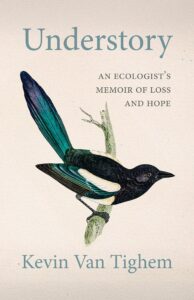Everyone I know is worried about the climate crisis. I’ve had friends tell me that they don’t want to have kids because the planet is dying and they feel hopeless about the future. They’re upset with the deforestation of the Amazon rainforest or when yet another species goes extinct because of humanity’s greed and hubris.
Kevin Van Tighem understands these feelings well. His memoir Understory recounts his experiences with nature, from camping trips in childhood to his career as an ecologist. It’s a personal and complex reflection on his life, his work, and his grief at the loss of the environment.

Van Tighem starts at the very beginning, when his great-great uncle Leonard came to Alberta in 1883 as a Catholic priest to spread the word of God to Indigenous people. His uncle Frank is also a priest; Van Tighem was raised Catholic and this comes up frequently in his memoir, as he references the Bible and God throughout.
Because he lived in Alberta for most of his life, Van Tighem talks about the oil industry and how the government prioritized making a profit over protecting the environment. The climate crisis hadn’t really started yet when he was growing up in the ’60s, but even as a kid his father pointed out how the oil refineries were polluting the rivers.
As the book progresses, the reader follows Van Tighem’s journey from a young boy who was devastated after finding a blackbird caught in an oil-filled puddle into a jaded man who feels lost as he watches the forests he grew up playing in get demolished for more refineries.
His descriptions of the landscapes paint a detailed picture for the reader: the sparkling rivers he went fishing in, the lush trees in the deep forest, the view of the sunrise from the Rockies. It feels so immersive, and then he reminds us that there are few places that still hold that beauty. It really makes you feel his grief.
I enjoyed his reflections on how his family contributed to colonization and how that relates back to his grief. He understands that in colonizing Alberta, his ancestors also industrialized it, which led to a lot of deforestation and loss of habitat for many species. He keeps the book in chronological order, switching from anecdotes of birdwatching into recalling what the oil industry caused to the environment in that same year.
There were some parts of the book I disliked, though. Van Tighem names almost everyone that he’s ever interacted with, and keeping track of all these names can become tedious; granted, this is a problem I find with most memoirs. He’s also part of the baby boomer generation, which he brings up often and not always smoothly, making some parts of the book feel cringeworthy. I feel similarly about the near-constant mentions of Catholicism. I understand it’s a huge part of his life and his upbringing; however, it does start to feel repetitive and almost preachy.
Overall, I loved reading Understory. I really felt like I was walking alongside Van Tighem and following every step through that journey—from anger into grief and, lastly, into hope. Because there is some hope in all of this, and he closes on this for a reason. The main takeaway of the book is that ending the climate crisis is not a hopeless endeavour, but something we should all strive toward.

